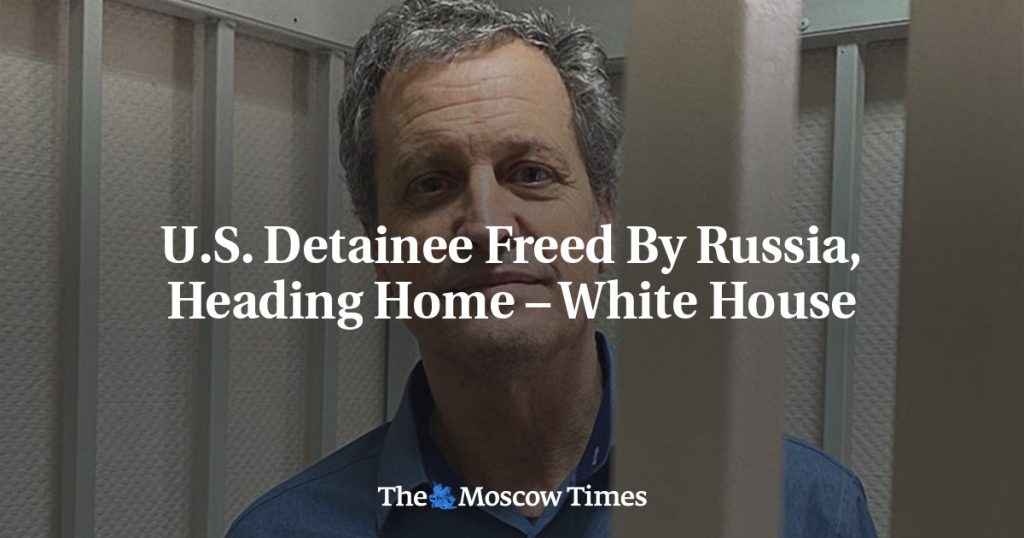Moscow Frees American Prisoner in a Diplomatic Breakthrough
In a significant diplomatic development, Moscow released American prisoner Marc Fogel on Tuesday, marking a rare instance of cooperation between the U.S. and Russia amid heightened tensions over the Ukraine war. The release was facilitated by a high-level visit from a member of President Donald Trump’s administration, a move that the White House described as a "show of good faith" by Russia. Fogel, who had been detained since 2021 on drug charges, is now on his way back to the United States, where he will be reunited with his family.
The White House emphasized that the release was part of an "exchange," though it did not provide further details about the terms of the agreement. The successful negotiation was spearheaded by Steve Witkoff, a real estate developer and close ally of President Trump, who serves as his envoy to the Middle East. Witkoff, who played a key role in brokering a fragile ceasefire between Israel and Hamas earlier this year, became the first senior U.S. official known to have visited Russia in recent years. His visit and involvement in Fogel’s release underscore the Trump administration’s efforts to engage with Russia despite the ongoing conflict in Ukraine.
The Significance of the Prisoner Exchange
The release of Marc Fogel is being viewed as a potential turning point in U.S.-Russia relations, which have been severely strained since Russia’s invasion of Ukraine in February 2022. The White House has framed the exchange as a constructive step toward ending the war in Ukraine, with National Security Advisor Mike Waltz stating that it demonstrates "good faith" from Russia and progress toward a resolution. The administration is hopeful that this gesture could pave the way for further diplomatic efforts to bring an end to the conflict.
Fogel’s release also highlights the Trump administration’s approach to negotiating with Russia, which has been a subject of both praise and criticism. While former President Joe Biden’s administration largely severed direct communication with Russia following the invasion of Ukraine, the Trump administration has taken a different tack, engaging through intermediaries like Witkoff. This strategy has yielded results in the form of prisoner exchanges, though it remains to be seen whether it will lead to broader diplomatic breakthroughs.
Steve Witkoff’s Role in the Negotiations
Steve Witkoff, a longtime friend and ally of President Trump, emerged as a key player in securing Marc Fogel’s release. Witkoff, who has served as Trump’s Middle East envoy, traveled to Russia to negotiate the prisoner exchange, marking the first known visit by a senior U.S. official to the country in years. His involvement underscores the Trump administration’s willingness to engage with Russia through unconventional channels, even as the U.S. continues to support Ukraine in the ongoing conflict.
Witkoff’s success in negotiating Fogel’s release follows his earlier efforts in the Middle East, where he helped broker a temporary ceasefire between Israel and Hamas. His ability to operate in sensitive geopolitical environments has made him a valuable asset to the Trump administration, which has often favored personal diplomacy over traditional statecraft. Witkoff’s involvement in the Fogel case also suggests that the administration is exploring creative avenues to improve relations with Russia, even as tensions remain high.
A Glimmer of Hope for U.S.-Russia Relations
The release of Marc Fogel has been interpreted as a rare glimmer of hope for improved relations between the United States and Russia. While the two nations remain deeply divided over the Ukraine war, the prisoner exchange suggests that channels of communication are still open. The White House has characterized the release as a "show of good faith" by Russia, and there is optimism that it could set the stage for further diplomatic engagement.
However, the path forward remains fraught with challenges. The Ukraine war continues to cast a long shadow over U.S.-Russia relations, with both sides entrenched in their positions. The Trump administration’s approach of engaging with Russia through intermediaries like Witkoff has yielded results in this specific case, but it remains to be seen whether it can lead to more substantial progress on the broader issues dividing the two nations.
A New Visit to Ukraine Signals Continued Support
Just hours after announcing Marc Fogel’s release, President Trump revealed that U.S. Treasury Secretary Scott Bessent would visit Ukraine in the coming days. Bessent, a senior official in the Trump administration, is expected to meet with Ukrainian President Volodymyr Zelensky to discuss ongoing U.S. support for Ukraine. The visit underscores the administration’s commitment to backing Ukraine in its conflict with Russia, even as it explores diplomatic avenues with Moscow.
The simultaneous pursuit of diplomacy with Russia and support for Ukraine reflects the complexities of the Trump administration’s foreign policy. While the release of Marc Fogel offers a rare bright spot in U.S.-Russia relations, the administration is also signaling that it will continue to stand by Ukraine in its struggle against Russian aggression. This dual approach highlights the delicate balance the U.S. must strike in navigating its relationships with both nations.
Conclusion: A Cautious Optimism for Diplomacy
The release of Marc Fogel and the involvement of Steve Witkoff in the negotiations offer a rare reminder of the power of diplomacy in even the most challenging geopolitical contexts. While the path to resolving the Ukraine war remains uncertain, the prisoner exchange suggests that dialogue between the U.S. and Russia is still possible. The Trump administration’s willingness to engage with Russia through unconventional channels has yielded results in this case, though it remains to be seen whether it can lead to more sweeping diplomatic achievements.
As the U.S. continues to support Ukraine in its conflict with Russia, the release of Marc Fogel serves as a poignant reminder of the human cost of international disputes and the importance of diplomacy in bringing people home. While the road ahead is long and uncertain, the success of this prisoner exchange offers a glimmer of hope that even in the darkest of times, dialogue and cooperation can prevail.












